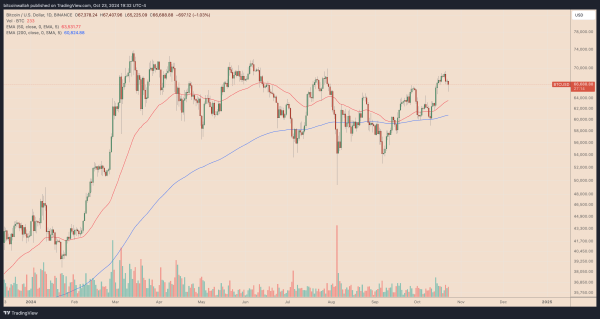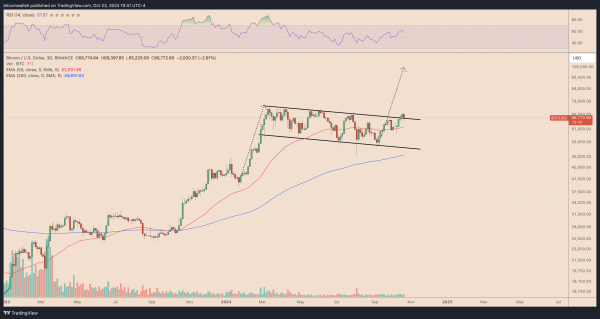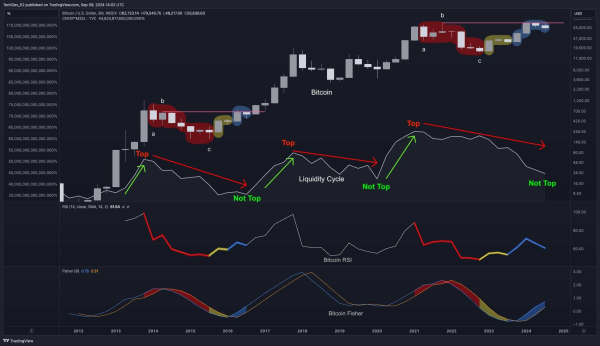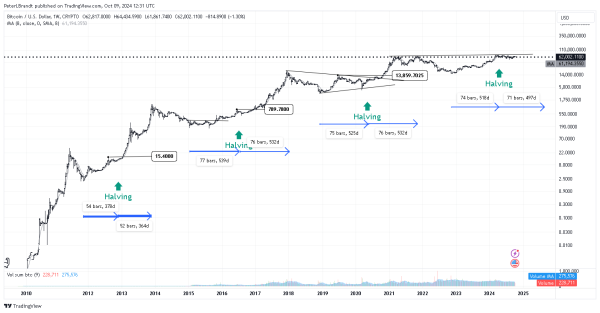3 Critical Bitcoin Charts to Watch Out Amid Growing $100K BTC Price Calls
Bitcoin (BTC) analysts, including Wall Street veterans like Mike Novogratz and Cathie Wood, have long predicted a $100,000 price target for the cryptocurrency.
However, their expectations have fallen short every time, including this year, in which BTC’s price has been consolidating since it established a record high of around $74,000 in March 2024.

Nonetheless, calls for a $100,000 Bitcoin are growing again, with fundamentals such as the ongoing interest rate cuts in the U.S. and rising institutional interest supporting the bullish outlook.
Here are three charts that risk-oriented traders should definitely monitor closely to navigate the noise and make informed trading decisions.
Bitcoin is Showing a “Perfect Breakout and Retest” Symptoms
Bitcoin recently closed above its multi-month consolidation range thanks to its 40%-plus recovery since August 2024. The cryptocurrency picked its upside cues mainly from the Federal Reserve’s 50 basis points (bps) rate cut in September, followed by a better-than-expected Wall Street earnings season.
However, its upside momentum has weakened since Oct. 21, confirmed by the latest 6% correction from the local high of around $69,400. “Moustache,” a pseudonymous crypto analyst, meanwhile, calls Bitcoin’s correction “a perfect breakout and retest,” indicating a bullish continuation in the coming months.
#Bitcoin
Looks like a perfect breakout and retest to me.
Why do I think $BTC will find a bottom at this level?
-Too many are waiting for 62k or even 49k
I mean, sure we can go lower, but NEVER forget:
-The biggest risk in life is not taking any at all🧘♀️ pic.twitter.com/D7WXwCTDyV
— 𝕄𝕠𝕦𝕤𝕥𝕒𝕔ⓗ𝕖 🧲 (@el_crypto_prof) October 23, 2024
His upside outlooks stems from Bitcoin’s consolidation trend itself, which resembles a bull flag pattern on longer-timeframe charts.

A bull flag forms when the price trends lower inside a descending parallel channel following massive rallies. It shows that sellers are testing the market despite being strong enough to reverse the overall trend.
As a result, bull flags typically resolve in breakouts when the price rises above their upper trendlines. Often, the price returns to retest the upper trendline as suppport, before continuing its price rally, which appears to be the case analyst Moustache is making.
If he is correct, then BTC’s price next upside target is around $100,000, measured after the adding the previous uptrend’s height to the breakout point.
Nonetheless, Bitcoin’s return inside the bull flag channel raises risks for a correction toward the flag’s lower trendline—coinciding with the 200-3D exponential moving average (200-3D EMA; the blue wave) at around $50,000 by 2024’s end.
Bitcoin Liquidity Indicates ‘Not Top,’ Massive Rally Ahead
Pseudonymous analyst on X, TechDev, has provided his outlook of Bitcoin’s price cycles, emphasizing the relationship between liquidity cycles, RSI (Relative Strength Index), and the Fisher Transform indicator to identify market tops and bottoms, as shown below.
A liquidity cycle refers to the ebb and flow of money available for investment in the financial system.
In the context of Bitcoin, it measures how easily capital moves in and out of the crypto market, affecting buying and selling pressures. High liquidity typically coincides with bullish phases, as more capital flows into the market, driving up prices.
Conversely, low liquidity can trigger bearish trends, indicating that capital is exiting the market or sitting idle.

In the chart, liquidity cycles are visualized as a leading indicator of market tops and bottoms. Peaks in the cycle often signal overheated markets—potential tops—while troughs suggest that the market has bottomed out, presenting buying opportunities.
Meanwhile, the Fisher Transform indicator enhances trend readability by turning price data into a normalized Gaussian distribution. It makes sharp price reversals more apparent, smoothing out market noise.
Note that the Blue Momentum indicates bullish conditions, suggesting that the market may be heading higher. On the other hand, the Red Momentum points to bearish conditions, hinting at a possible downtrend.
Currently, it shows a bullish trend similar to previous rally periods. Combined with rising liquidity and a moderate RSI, it points to a potential continuation of Bitcoin’s bullish trend.
Bitcoin Halving Fractal Suggest Major Boom Ahead, As Well
Veteran market pundit Peter Brandt sees Bitcoin at $135,000 in 2025 due to its historically bullish performances after halvings every four years. Each Bitcoin halving—where the mining reward is cut in half—has historically led to significant price gains in the subsequent months.

Brandt’s analysis highlights that the strongest rallies often occur in the second half of these cycles. The current period, from March 2024 onward, appears to be a temporary consolidation phase within a broader bullish trend. He remains optimistic, setting a $135,000 price target for Bitcoin by August or September 2025, implying a significant rally in the upcoming year.
However, Brandt also notes a key downside risk: if Bitcoin closes below $48,000, it would invalidate his bullish outlook, suggesting a potential trend reversal. For now, the analysis leans toward a continuation of the uptrend, driven by Bitcoin’s cyclical post-halving momentum.